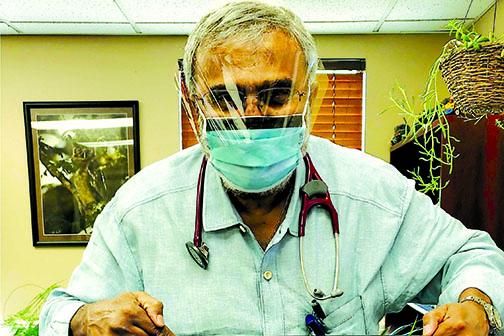Dr. Anand Kuruvilla has one word for the community when it comes to the pandemic we face today in the spread of the coronavirus.
“It’s fomite,” said Kuruvilla, who is director of the Cancer Center of Putnam. “I think people need to be familiar with the word. It’s a surface where viruses can attach itself so the public needs to be aware of it.”
The definition of the word from Wikipedia is any inanimate object that, when contaminated with or exposed to infectious agents, such as pathogenic bacteria, viruses or fungi, can transfer disease to a new host.
According to Kuruvilla, those surfaces include phones, computer keyboards, computer screens, tabletops, chair handles, doorknobs, faucet handles, the newspaper, milk cartons, produce and more.
“All of these things are examples of fomites,” he said.
As a healthcare professional, Kuruvilla is speaking as an individual physician not representing any organization, but as a physician using common sense.
“For those who go out to the grocery store, when they return home they need to first go and have a shower and then put their worn clothes in the laundry,” he said. “The stuff they purchase or the newspaper they pick up from the driveway or their mailbox should be put in their garage for about an hour before they bring it into the house.”
Of course, that doesn’t include nonperishables.
“The things that are brought into the house should be washed with soap, water and bleach when possible,” Kuruvilla said. “The idea is to wipe down with bleach the things you touch such as door handles, the faucet, tabletops and countertops. It’s a way to make sure you don’t get the virus onto yourself. Produce should also be washed.”
Kuruvilla, whose office remains open at the Cancer Center in Palatka, is also using a mask for protection and encourages it even though some advice he’s heard given was only the sick should wear them.
“If you can get a mask, use it,” he said. “How do you know if the person sitting across from you doesn’t have the virus. You don’t know. It’s best to assume the people we encounter are exhaling the virus.”
Kuruvilla feels the battle against the coronavirus is going to be an indefinite process.
“It will take several months before we can sound the all-clear signal,” he said. “There is a lot of uncertainty as to whether the lockdown or self-isolation should be temporary, intermittent or permanent.”
Kuruvilla said in the meantime, federal, state and local hospitals and medical professionals are scrambling toward making more testing available, as well as protective gear.
“I anticipate within the end of April there should be plenty of supplies,” he said. “So it behooves us until the supplies become available to us to self-isolate and avoid contact with crowds.”
Kuruvilla is concerned the community isn’t being told with enough emphasis they need to wipe down the things they touch, too.
“I think it’s important we convey this to people,” he said. “I’m confident that given time with the sources and the bipartisan effort between the federal government and private industry that we will be able to get the testing, get the protection kits and in short order within six months to a year hopefully get a vaccine. I think that by the end of the year, we should be in good shape. And be able to inoculate ourselves until life can get back to normal. I think for the next several weeks and months we have to be in isolation mode.”
Kuruvilla also suggests people who don’t need to be in their offices should be working at home.
“This is nobody’s fault,” he said. “It’s not a Republican problem or a Democratic problem or a CDC problem. It’s reality. It’s foolish to complain and say we should have been prepared.”
Instead, Kuruvilla thinks everyone should be asking the question, “How quick can we recover?”
“It’s important to educate the public,” he said. “Young or old, you have to avoid getting affected or spreading the virus. People should not be going on cruises or to Disney World. I think the point is we all need to get our acts together.”
For Kuruvilla, it’s business as usual, but with the exception of precautionary measures for his staff and patients.
“We are taking steps at the center to protect our patients from others,” he said by phone on Friday. “We are treating those on our schedules and doing telemedicine when appropriate and calling and talking to them to find out how they are doing.”
With social distancing becoming the norm for many, it’s not surprising the numbers are down for those seen in Kuruvilla’s office.
“We are discouraging those who don’t need to come in to stay at home,” he said. “I can go over their test results with them on the phone. We are only seeing those who need to be seen.”
Patients currently undergoing treatment are encouraged by Kuruvilla to continue and surgical procedures that are planned are being done.
“Cancer does not wait for man or beast or virus,” he said.

